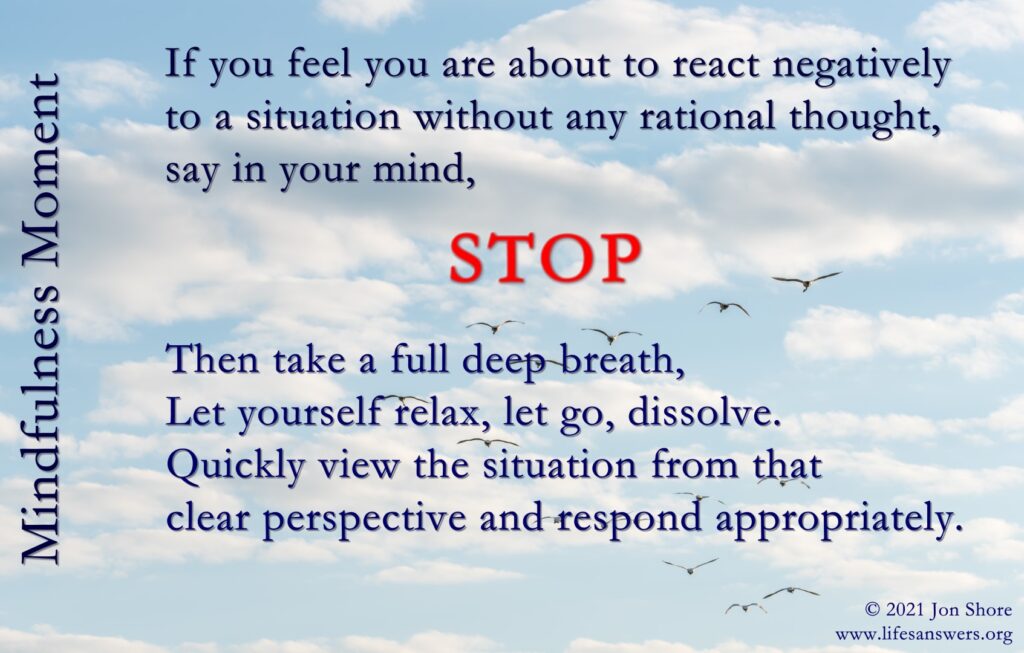Dealing with Chronic Anger Disorder – a Psychospiritual Approach by Jon Shore
While anger may be considered a natural and normal human emotion and reaction this does not mean that it must remain so for all of human history. Humans can and must evolve for the survival of the species. When viewed objectively, anger is actually a weakness and a vulnerability. Anger, expressing anger, storing anger and sublimating anger are all damaging to body and mind. Anger is also addictive emotionally and physically.
Anger causes the release of neurochemicals/neurotransmitters like norepinephrine and dopamine which are associated with human stress responses. These chemicals can cause the body to feel stronger for a few minutes. They can also feel ‘empowering’ like cocaine or methamphetamine. But they can also cause aggression, rage and the inability to see reality clearly and objectively. These neurotransmitters can also be addictive like their external chemical counterparts.
The question remains; can dealing with perceived threats or stress without anger be an evolutionary change? Are human beings capable of transforming themselves in such a basic and profound way? While a moment of anger in a particularly stressful situation can be a ‘natural’ reaction it does not necessarily have to be. There are far more productive ways of dealing with a stressful situation or a perceived threat. Reacting with anger can become a choice with the proper tools, strategies and self-awareness.
Chronic Anger
The focus of this article though is to understand chronic anger. Chronic anger may seethe beneath the surface and rise at the slightest perceived provocation. It quite often becomes an integral part of an individual’s persona and is ever present. For some, chronic anger lies quietly and subliminally beneath the surface of conscious awareness but still affects the individual in many subtle ways. Others may notice it as a sense that they need to be cautious around the individual to not trigger an angry response.
Chronic anger can manifest as argumentativeness, grievance, frustration, cynicism, constant criticism, demeaning others and oneself, volatility, dissatisfaction, resentment, self-destructive decisions and so much more.
Chronic anger can be a cause of low self-esteem, chronic stress and stress related mental and physical disorders, disease, a weak immune system, depression, paranoia, lack of clarity, inability to retain information, lack of critical thinking skills, guilt, poor decision making, vulnerability to manipulation as well as many other issues.
Anger is like a fog that clouds the mind or a pair of wrap around red glasses that disallows the ability to see reality clearly. Chronic anger can filter every experience. For the individual with chronic anger, anger and angry responses and reactions are normal. For those close to the individual with chronic anger this prevailing sense of anger can also become normalized. Those close to the individual with chronic anger may also become chronically angry themselves. Children who grow up in a home where chronic anger and outbursts are normalized tend to become chronically angry and may not even recognize the anger in themselves. Certain emotions can also be passed to a fetus in Utero, including chronic anger. I have often had clients who have had anger issues since they can remember. They cannot remember a time when they did not feel that undercurrent of subliminal anger.
Chronic anger also has numerous potential sociological effects. Those who manipulate others often use anger as a means of manipulation. Propagandists know that individuals or groups who are angry are easy to convince of anything that reinforces the anger within them and that normalizes their anger. Those with chronic anger are often attracted to others who are also chronically angry. They may join in grievance and hate groups, movements and activities.
Dealing with Chronic Anger
How is chronic anger removed from the personality?
Let’s address this in a personal way. Obviously this is a very high level and general explanation of the process but it can be a start for you.
The first step is to become aware of the anger within. This requires deep and honest introspection and self-examination. Are any of the manifestations of chronic anger, previously mentioned, present in your life? Do people who are close to you feel as if they are walking on egg shells around you? Are they sometimes afraid to be honest with you? Are you highly sensitive to criticism? Are you volatile, resentful, overly critical, self-destructive, frustrated often, too often making poor decisions, expressing grievances on a regular basis? Do you have difficulty keeping friends? These are just a few of the manifestations to look for. Be absolutely honest with yourself.
Sitting quietly, contemplating or meditating can be helpful in the introspection process. Remove as many distractions as possible. Allow yourself to feel deeply within. Examine what you experience without fear or judgment. Just explore your deep inner emotions, beliefs, feelings and reactions. Examine your memories and the feelings that arise. It can be helpful to make note of these for later reference.
The next step is to ‘listen’ to what the anger says, how it feels, how it makes you feel. Get to know it. Examine it as if it were something residing within you but not you. Imagine separating yourself from it. Do your best to do this without judging the anger, trying to get rid of it or control it. Just examine it as objectively as possible. Be curious. Be an explorer. Again, make note of what you discover.
Once you have defined it and know it intimately, it is time to be discerning. Is what the anger says true? Is the anger really protecting you? What purpose does it serve? What does it want? Where does it come from? How does it affect your mind and body? What physical feelings does it engender? Where does it reside in your body or mind? Do your or have you had any physical issues in that area of your body? Is it really a part of who you are? What happens if it is gone?
At this point you will be in a position to choose whether you hold on to the chronic anger or let it go. In a quiet and contemplative state of mind you must ask yourself questions like;
Is this really me?
Is this the way I want to live the rest of my life?
If this is not who I really am, then who am I?
Who am I without the anger?
Does this anger really serve me?
Does it enhance my life and help me feel fulfillment?
Be sure to make note of everything you discover and go over those noted periodically.
By asking these questions and being absolutely honest with the answers you will achieve a sense of self-awareness. Eventually you will experience a greater and more profound sense of self where anger has no place and no effect. A sense of self that is strong, powerful, fulfilled and confident. A sense of self that radiates calmness, peace, acceptance, wisdom and self-assuredness. You will find that anger is not necessary any longer and that you have access to far greater strength and clarity without it.
∞
All of this takes a great deal of work, courage, honesty and commitment. But this is how you make the sort of changes that are evolutionary. This is how you change your life for the better and how you experience everything you are capable of being.
I am not suggesting that making such a change is easy. I am suggesting that human beings must evolve to survive.

© 2024 Jon Shore
All rights reserved
To repost or reprint this article contact Jon Shore at reachout@lifesanswers.org.
